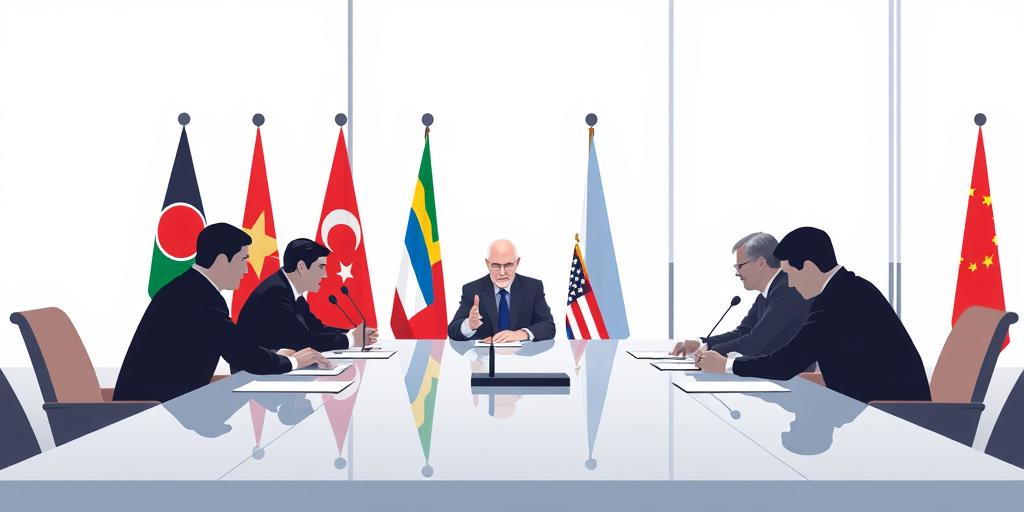The Indispensable Role of Diplomacy in Resolving Border Conflicts
Border conflicts, often deeply rooted in historical, ethnic, economic, and political factors, pose significant threats to international peace and security. These disputes, characterized by territorial claims and disagreements over boundaries, can escalate into violent confrontations, destabilize regions, and undermine international relations. While military force might seem like a decisive solution, history demonstrates that lasting resolutions to border disputes are more effectively achieved through diplomacy.
Understanding the Nature of Border Conflicts
Border conflicts are rarely simple matters. They frequently involve:
- Historical Grievances: Past injustices and unresolved territorial claims.
- Economic Interests: Competition over resources such as water, oil, or arable land.
- Ethnic and Cultural Divisions: Disputes arising from the presence of different ethnic groups along border regions.
- Political Ambitions: Nationalistic aspirations and power struggles.
These complex layers necessitate multifaceted approaches, where diplomacy plays a central role.
The Strengths of Diplomacy in Conflict Resolution
Diplomacy offers several advantages in addressing border conflicts:
Peaceful Negotiation: Diplomacy provides a platform for parties to engage in dialogue, exchange perspectives, and seek common ground without resorting to violence. This is essential for de-escalation and preventing further loss of life.
Comprehensive Solutions: Diplomats can address the root causes of conflicts by exploring a wide range of solutions, including boundary adjustments, joint resource management, economic cooperation, and power-sharing arrangements.
International Law and Norms: Diplomacy operates within the framework of international law and established norms of state behavior. This provides a basis for impartial assessment and just resolutions. International treaties, such as those governing maritime boundaries or transboundary resources, offer precedents and guidelines for resolving disputes.
Mediation and Facilitation: Third-party mediators, such as international organizations (e.g., the United Nations) or neutral states, can play a crucial role in facilitating communication, building trust, and proposing compromise solutions. Their involvement can help overcome deadlocks and create a more conducive environment for negotiation.
Long-Term Stability: Diplomatic solutions, when successful, are more likely to foster long-term stability and cooperation between states. By addressing underlying issues and promoting mutual understanding, diplomacy helps build sustainable peace.
Case Studies: Diplomatic Successes
Numerous examples demonstrate the effectiveness of diplomacy in resolving border conflicts. The resolution of the Beagle Channel dispute between Argentina and Chile through papal mediation in the late 1970s is a prime example. Similarly, the International Court of Justice's adjudication of the land and maritime boundary dispute between Nigeria and Cameroon in the early 2000s showcases the role of international law in peaceful settlement. The ongoing efforts to demarcate the border between Ethiopia and Eritrea, albeit challenging, underscore the necessity of continued diplomatic engagement, even in the face of setbacks.
Challenges and Limitations
Despite its strengths, diplomacy also faces challenges:
- Lack of Political Will: Parties may be unwilling to compromise or engage in good-faith negotiations.
- Power Imbalances: Asymmetrical power dynamics can disadvantage weaker states.
- Domestic Constraints: Internal political pressures and public opinion can limit a government's flexibility in negotiations.
- External Interference: Interference from external actors can complicate the process and undermine diplomatic efforts.
These challenges necessitate a combination of strategies, including confidence-building measures, incentives for cooperation, and, when necessary, the application of targeted sanctions or other forms of pressure.
Conclusion
In conclusion, while the path to resolving border conflicts through diplomacy is often complex and fraught with challenges, it remains the most effective and sustainable approach. By prioritizing peaceful negotiation, upholding international law, and fostering mutual understanding, diplomacy can pave the way for lasting resolutions and contribute to a more stable and peaceful world. The alternative – resorting to force – invariably leads to further suffering, instability, and ultimately, fails to address the underlying causes of conflict. Therefore, diplomacy must remain at the forefront of efforts to resolve border disputes and build a future where peaceful coexistence prevails.









